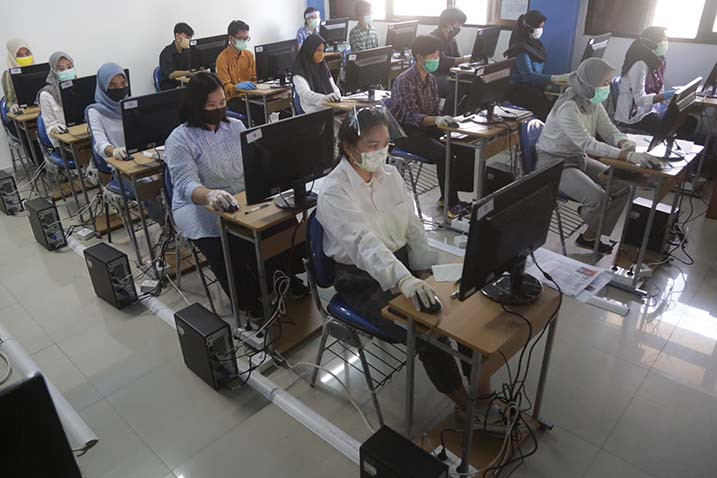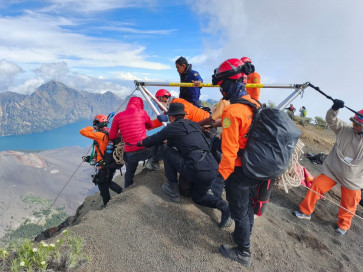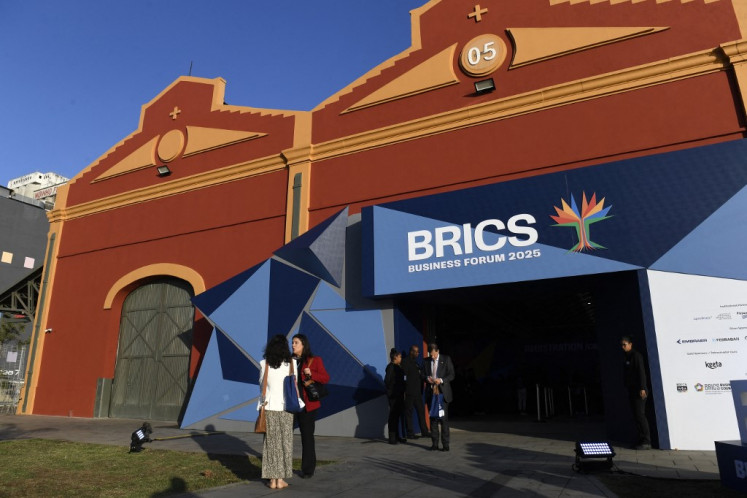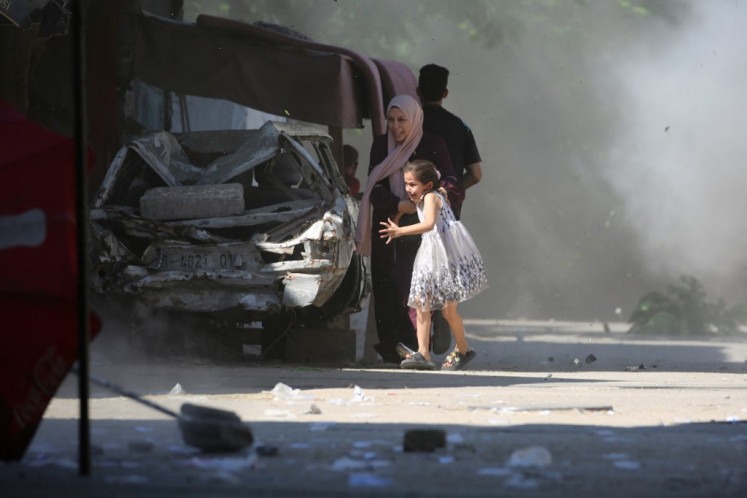Popular Reads
Top Results
Can't find what you're looking for?
View all search resultsPopular Reads
Top Results
Can't find what you're looking for?
View all search resultsEntrance exams held with ‘misguided’ health protocols
As Indonesia scrambles to contain the COVID-19 outbreak, some 703,875 test-takers are trying to keep themselves together in order to earn a place in one of the country’s state universities, all while following strict health protocols that one expert has criticized as "misguided".
Change text size
Gift Premium Articles
to Anyone
A
fter graduating from high school, an achievement she could only celebrate with her friends via TikTok, 18-year-old Daariin Ariij Nabiila Mumtaz had to sit the highly competitive annual state university entrance test (SBMPTN), wearing a mask and a face shield for protection.
Prior to entering the test venue on Sunday, she had to undergo a body temperature check, wash her hands at least twice and clean her desk and computer with disinfectant wipes.
As Indonesia scrambles to contain the COVID-19 outbreak, some 703,875 test-takers are trying to keep themselves together in order to earn a place in one of the country’s state universities, all while following strict health protocols that one expert has criticized as "misguided".
Taking a computer-based exam (UTBK) is one of three ways high school graduates can earn one of the limited number of places offered at state universities in Indonesia, which has been trying to increase its university participation rate from the current 30.29 percent. The exams will be held in two batches, from July 5 to 14 and from July 20 to 29 at 74 test centers in cities across the country, including in the COVID-19 epicenters of Surabaya in East Java and Jakarta, with rooms at universities and schools being used as test venues.
The Institution of University Entrance Exams (LTMPT), formed in 2019 to oversee the exams, requires body temperature checks on site and has advised test-takers to wear masks, face shields and gloves. It also reduced the number of participants in each room and the number of sessions to just two from four a day.
But some local administrations and universities are now requiring test-takers to also undergo a rapid antibody test before sitting the entrance exam.
LTMPT issued a circular on July 5, the first day of the exams, stating that those would had recorded “reactive” rapid test results – indicating virus exposure – or those with a temperature above 37.5 degrees Celsius would be required to take the more conclusive polymerase chain reaction (PCR) test on their own before proceeding with the entrance exam. If the PCR result comes back negative, they may reschedule their UTBK test to the second batch of exams, but if positive, they will not be allowed to take the test at all.
LTMPT head Mohammad Nasih, who is also the rector of Airlangga University in Surabaya, said those with a fever or who tested positive for COVID-19 should "focus on their health first". Only once they recovery could they reschedule their exams "if there is still time".
He pointed to the Surabaya administration and the University of Halu Oleo in Kendari, Southeast Sulawesi, as examples of entities that had made “nonreactive” rapid test results or negative PCR tests results a requirement to sit the exam.
Other universities, such as Soedirman University and Sebelas Maret University (UNS) in Central Java, another province hit hard by the outbreak, have instituted a similar requirement, but only for test-takers traveling from other regions.
One high school graduate from Ngawi, East Java, could not take the UNS admission tests on Sunday after failing to present evidence of a rapid test result, rector Jamal Wiwoho said, as reported by tribunnews.com.
Surabaya, Indonesia's second-largest city that accounts for half of East Java's COVID-19 cases and deaths, drew criticism for announcing the new requirement only three days before the first batch of exams started, prompting test-takers to swarm testing facilities in the city.
A petition on change.org urging Surabaya to conduct free rapid tests for UTBK test-takers made the rounds on social media, citing that "the prices for rapid and swab tests are very expensive" and that "the decision was issued so suddenly that test-takers scheduled for the UBTK's first batch were confused". At least 9,927 people had signed the petition as of Tuesday.
"It is too sudden. I was hoping they'd provide free tests. I paid Rp 200,000 [US$13.9] for mine [rapid antibody test], which is already discounted from the normal price of Rp 400,000 for UTBK test-takers,” said 18-year-old test-taker Firmansyah Putra Pratama from Surabaya. “The prices vary, some places charge more than Rp 300,000."
The Surabaya administration said it would offer provide free rapid tests at community health centers for test-takers from low-income families, while some universities are providing the tests, with some test kits coming from the East Java administration.
Indonesia, which has one of the lowest testing rates in the world, is currently prioritizing its free PCR tests for people with symptoms or who have been in contact with confirmed cases. But even now some have to wait a week or more for their test results as labs are not evenly distributed across the archipelago.
The Health Ministry only issued a circular on June 6 determining the highest price rate for rapid antibody test at Rp 150,000.
Those seeking to undergo swabs tests on their own accord face prices that range into the millions of rupiah.
Health Ministry director general for health services Bambang Wibowo told a hearing with lawmakers in June that PCR tests were indeed "quite pricey" and that government facilities might spend up to Rp 1.2 million per PCR test and that the prices charged by private facilities could be higher.
The more commonly found rapid antibody tests are cheaper in comparison, and also give faster results, but experts have warned that such tests produce inconclusive results and, therefore, should not be used for diagnosis.
Epidemiologist Windhu Purnomo from Airlangga University said the test requirement was "confusing" and demonstrated a "misguided" understanding of the function of rapid tests. He said the tests could be used for COVID-19 surveillance and mass screening, but not to terminate transmission chains, let alone for making decisions on whether test-takers could sit the exams.
"Rapid tests cannot be carried out just once,” he said. “It cannot be assumed that nonreactive results mean someone is free of the virus and cannot transmit the virus; they might have it but their antibodies have not yet formed. And those with reactive results may not actually have an active infection but still are required to go home, isolate and reschedule.”










